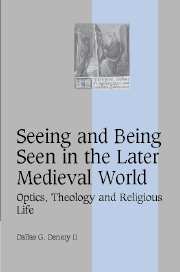Book contents
- Frontmatter
- Contents
- Acknowledgments
- INTRODUCTION: VISION AND VISUAL ANALOGY DURING THE LATER MIDDLE AGES
- 1 PONDERARE STATERA MEDITATIONIS: SELF AS SELF-PRESENTATION IN EARLY DOMINICAN RELIGIOUS LIFE
- 2 THE DEVIL IN HUMAN FORM: CONFESSION, DECEPTION AND SELF-KNOWLEDGE
- 3 PETER OF LIMOGES, PERSPECTIVIST OPTICS AND THE DISPLACEMENT OF VISION
- 4 NORMALIZING ERROR: PETER AUREOL ON THE IMPORTANCE OF APPEARANCES
- 5 PROBABILITY AND PERSPECTIVE: NICHOLAS OF AUTRECOURT AND THE FRAGMENTATION OF VISION
- CONCLUSION: VISION, PROMISE, DEFERRAL
- Bibliography
- Index
- Cambridge Studies in Medieval Life and Thought Fourth series
2 - THE DEVIL IN HUMAN FORM: CONFESSION, DECEPTION AND SELF-KNOWLEDGE
Published online by Cambridge University Press: 18 July 2009
- Frontmatter
- Contents
- Acknowledgments
- INTRODUCTION: VISION AND VISUAL ANALOGY DURING THE LATER MIDDLE AGES
- 1 PONDERARE STATERA MEDITATIONIS: SELF AS SELF-PRESENTATION IN EARLY DOMINICAN RELIGIOUS LIFE
- 2 THE DEVIL IN HUMAN FORM: CONFESSION, DECEPTION AND SELF-KNOWLEDGE
- 3 PETER OF LIMOGES, PERSPECTIVIST OPTICS AND THE DISPLACEMENT OF VISION
- 4 NORMALIZING ERROR: PETER AUREOL ON THE IMPORTANCE OF APPEARANCES
- 5 PROBABILITY AND PERSPECTIVE: NICHOLAS OF AUTRECOURT AND THE FRAGMENTATION OF VISION
- CONCLUSION: VISION, PROMISE, DEFERRAL
- Bibliography
- Index
- Cambridge Studies in Medieval Life and Thought Fourth series
Summary
In his Dialogue of Miracles, Caesarius of Heisterbach tells the story of a woman who came to give her annual Lenten confession. Kneeling before the priest, she “began to pour forth all the good deeds she could remember ever having done” and every fast she had ever undertaken. When the priest asked why she did not confess her sins, the woman replied that she was not aware of having committed any. The priest asked her to name her profession and, learning that she sold bits of iron, he began to question her. “Do you ever mix smaller pieces in bundles of larger pieces?” She admitted that, yes, she sometimes did this. “There is one mortal sin for that is deceit. Do you tell lies, perjure yourself or speak poorly of your rivals?” Again she admitted that, yes, sometimes she did these things as well. “These too are mortal sins and unless you accept and carry out a severe penance, you will quickly go to hell.” And the upshot of all this? Caesarius concludes his tale, “At these words the woman was frightened, realized that she had sinned and learned how she ought to confess for the future.” The story is a rather plain one. Lacking the supernatural or miraculous elements that characterize so many medieval stories about confession, that characterize so many of Caesarius' own stories, it simply tells the tale of a woman who was more than a little unclear about how to confess and of a priest who was more than happy to correct the error of her ways.
- Type
- Chapter
- Information
- Seeing and Being Seen in the Later Medieval WorldOptics, Theology and Religious Life, pp. 39 - 74Publisher: Cambridge University PressPrint publication year: 2005



